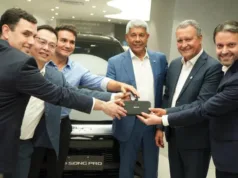While global electric vehicle giants battle over Western markets, a different kind of EV race is quietly accelerating in Africa. Chinese manufacturers, facing rising trade barriers in the United States and Europe, are aggressively turning to the continent as a new frontier, positioning themselves as the dominant players in Africa’s early-stage electric transition.
This move sees Chinese companies deploying a multi-pronged approach, from selling affordable cars to South Africa’s middle class to partnering with local startups that are building the ecosystem for electric buses and motorcycles.
With tariffs on Chinese EVs in the US reaching 154% and the European Union implementing its own trade barriers, Africa has become an attractive alternative market for China’s auto industry. Leading Chinese manufacturers are moving quickly to establish a foothold.
BYD, the world’s largest EV maker, is significantly expanding its retail presence in key markets. The company plans to nearly triple its dealership network in South Africa, increasing it to between 30 and 35 locations by the end of 2026 . Chery is also expanding rapidly in South Africa and has recently entered the Kenyan market, offering a range of electric and plug-in hybrid models.
Other Chinese automakers are making similar moves. BAIC is establishing a new assembly plant in Egypt with an ambitious goal to produce 50,000 units annually within five years. Meanwhile, Moja EV Kenya, a distributor of China’s Neta brand, introduced 100 Neta V electric taxis and plans to expand that fleet to 500 .
***
Beyond direct sales, a key strategy for Chinese integration into Africa’s EV space is through partnerships with local startups, particularly in the public and commercial transport sectors. These collaborations often combine Chinese manufacturing expertise with local operational knowledge.
In Kenya, BasiGo is working to electrify public transport by importing electric buses from BYD and assembling them locally. The company offers a “pay-as-you-drive” model for its 25-seater buses, which has provided drivers with savings of 5% to 15% compared to diesel buses. BasiGo has plans to supply 1,000 electric buses in East Africa within the next three years .
Another notable example is the partnership between e-hailing company Yango and Chinese automaker Changan to distribute electric vehicles to ride-hailing operators across Africa, representing a significant step in Changan’s push to expand its presence in the region .
A significant part of Africa’s EV story is unfolding not on four wheels, but on two and three. Motorcycles and tuk-tuks are an important vehicle segment on the continent, making them a ripe target for electrification.
Chinese companies are major suppliers in this space. Transsion, a company known for dominating Africa’s smartphone market, has now entered the EV race with its TankVolt e-bikes. Leveraging its extensive distribution network and understanding of African markets, Transsion has expanded into Nigeria, Kenya, Tanzania, and Ethiopia, and aims to repeat its success with smartphones and become an EV market leader.
Local startups also rely heavily on Chinese manufacturing but are adapting the products for local conditions. Startups like Ampersand in Rwanda and Roam in Kenya have found that standard imported Chinese motorcycles often break down or cannot handle the terrain.
Their solution has been to design their own vehicles and frames in-house, then import key components like batteries and drivetrains from China for local assembly, creating a hybrid model that leverages Chinese supply chains for bespoke African solutions.
***
The next phase of Chinese involvement is evolving from simple exports to establishing local industrial capacity. Morocco is emerging as a strategic hub, positioned as a gateway to both African and European markets.
Chinese company Gotion High Tech is building what is billed as Africa’s first EV gigafactory in Kenitra, Morocco. The facility, set to open in June 2026, is intended to manufacture electric batteries and is expected to serve markets in both Africa and Europe. This aligns with Morocco’s own ambitions to ensure 60% of its car exports are electric by 2030.
This shift towards local production is partly a response to African government policies. While countries like Kenya, Ghana, Rwanda, and Uganda have rolled back import duties on EVs to encourage adoption, some nations are also pushing for more local assembly and value addition within their borders.
Chinese ministries and state-linked associations are actively holding automotive summits with African governments, packaging new investments in assembly plants and charging infrastructure as part of “green mobility partnerships”. This concerted effort shows a deliberate attempt to weave Africa into China’s global EV strategy not just as a consumer, but as a integrated part of its supply chain.
Analysts note that Africa presents a long-term growth opportunity for the automotive industry, and Chinese manufacturers are well-positioned due to their affordable prices and growing reputation for quality and smart features, reprising their role in the smartphone revolution.
This influx of Chinese EVs and investment offers a faster path to cleaner transportation and potential job creation for African nations. The challenge for the continent will be to leverage this interest to build sustainable local industries, ensuring the green mobility transition also brings industrial development and does not create a new dependency .








